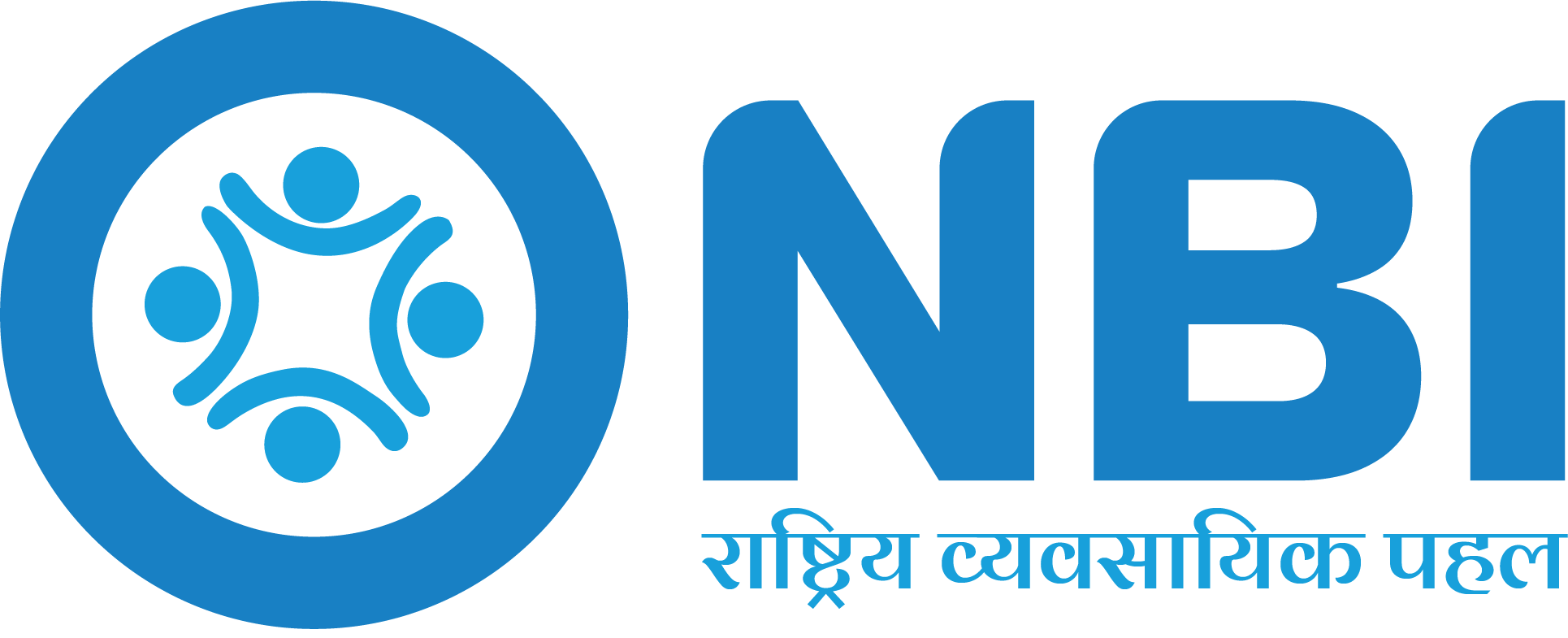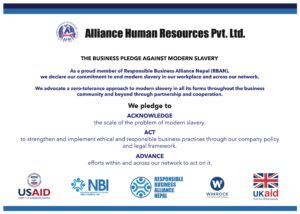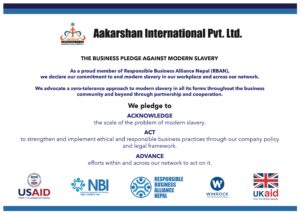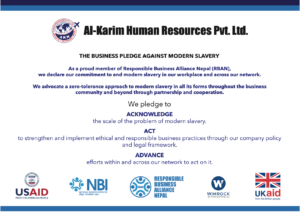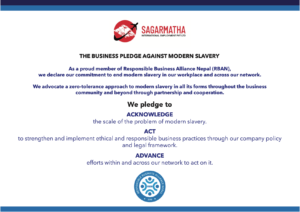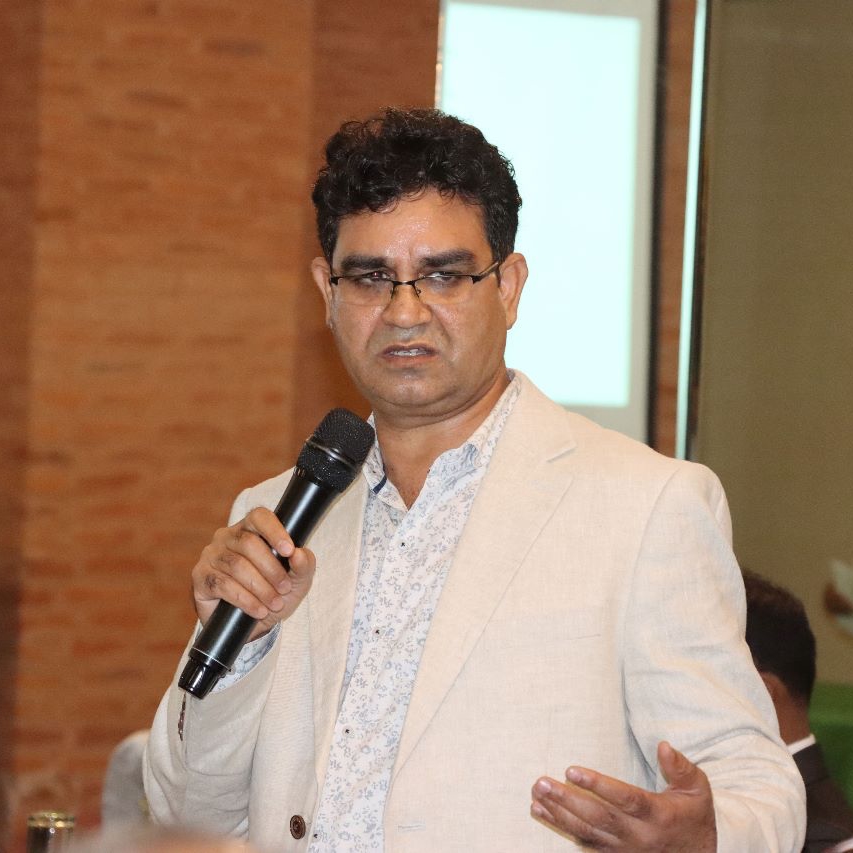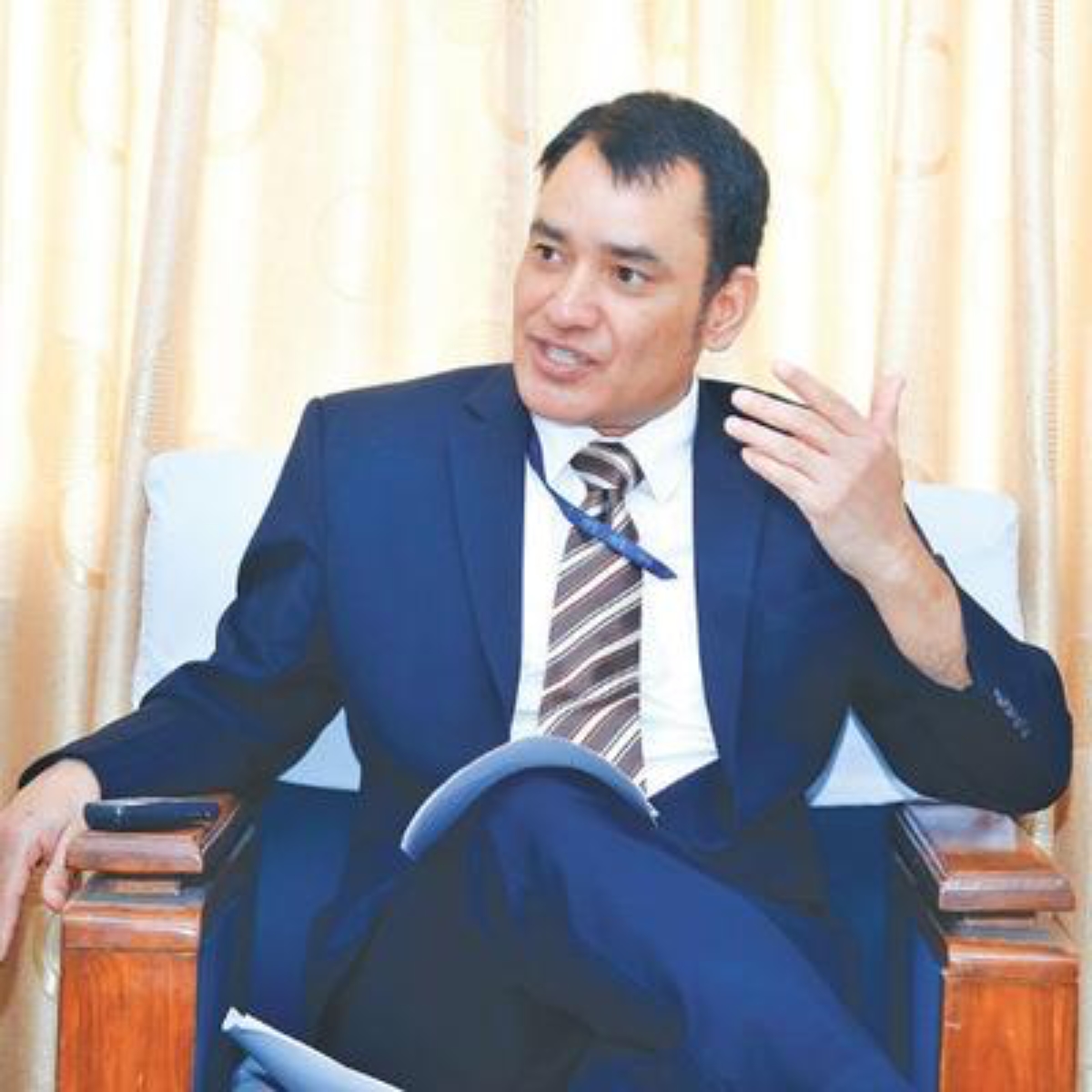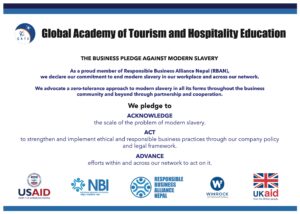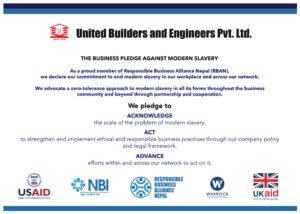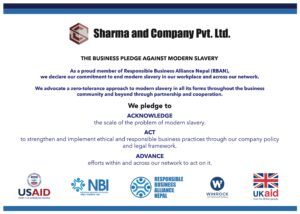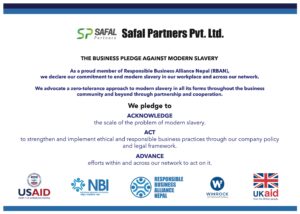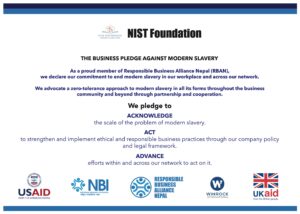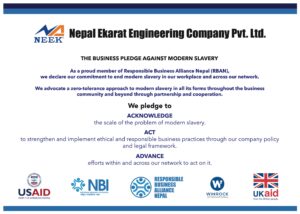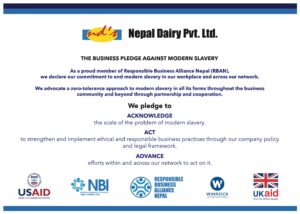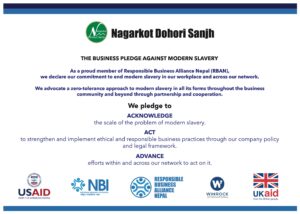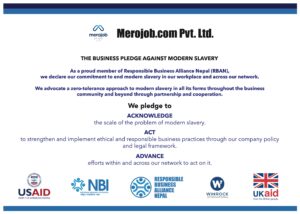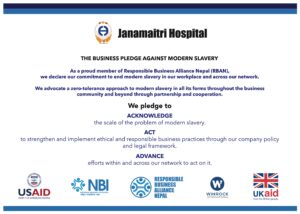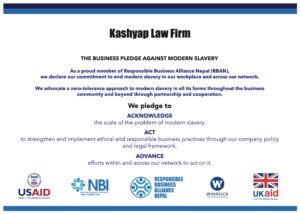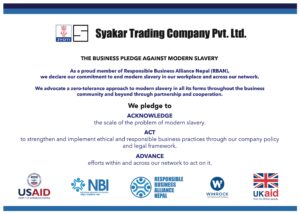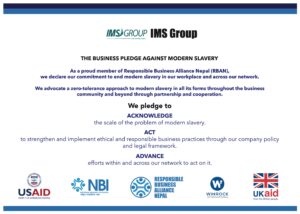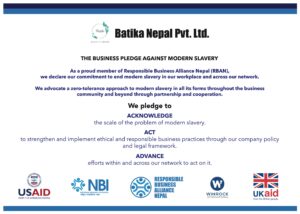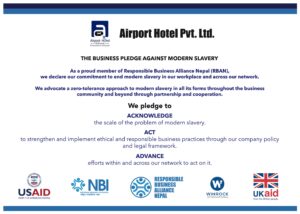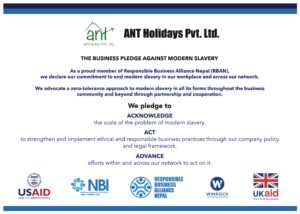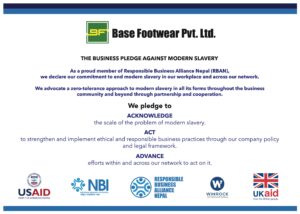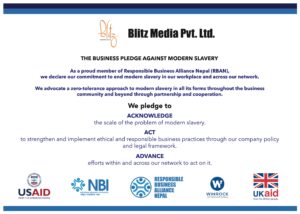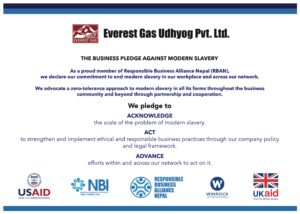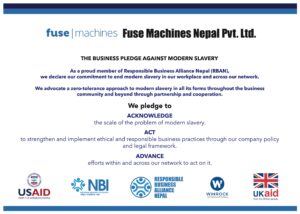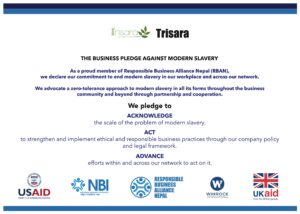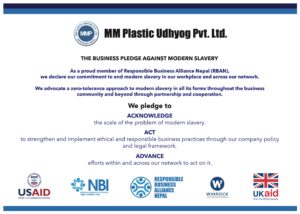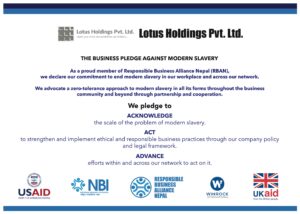1. Background
About Human Trafficking
The United Nations defines human trafficking as the recruitment, transportation, transfer, harboring, or receipt of persons by improper means (such as force, abduction, fraud, or coercion) for an improper purpose including forced labor or sexual exploitation.
Nepal is a source, transit, and destination country for labor, sex, organ, and other emerging forms of trafficking. The Global Slavery Index 2017 estimates that about 171,000 Nepalis are in forced labor or other forms of trafficking at any given time, with millions more vulnerable due to poverty, lack of employment and other livelihood opportunities, and lack of information about trafficking and services for victims and survivors. Countering trafficking-in-persons efforts include actions related to prevention of trafficking-in-persons (TIP), protection of survivors and at-risk population, as well as prosecution of traffickers in active partnership among the Government of Nepal, together with the civil society and the private sector.
About Hamro Samman Project
The USAID Hamro Samman project is a five-year CTIP project implemented by Winrock International. One of the objectives of Hamro Samman is to catalyze partnerships with and among the private sector, also known as Private Sector Engagement (PSE) for CTIP, to increase and improve services for trafficking-in-persons and at-risk populations. NBI is a partner in Hamro Samman Project to increase business sensitivity and action on CTIP in Nepal.
About NBI
NBI is a non-profit making organization established by major business associations and private companies of Nepal in 2005 with a vision to establish sustainable peace in Nepal through responsible socio-economic growth. The mission of NBI is to promote responsible business practices. To know in detail about NBI please visit our website in the link www.nbinepal.org.np
One key activity for NBI as a partner in the Hamro Samman project to increase business sensitivity and action on CTIP is the creation and sustenance of a High-level Business Alliance.
3. About Business Alliance
Business Alliance for Countering Trafficking in Persons in Nepal is an informal high-level strategic alliance of businesses to enhance business sensitivity and engagement in CTIP issues. Broadly, the priority CTIP issues under the NBI and HS partnership are:
1) Expanding skill-building and job access for target population;
2) Increasing TIP awareness and changing the behavior of target population; and
3) Catalyzing further business engagements and system-wide collaborations through wider learning and demonstration of scalable and innovative PSE models.
The alliance will adopt AAA Framework as the model for engagement of the private sector in CTIP issues. AAA stands for Acknowledgement, Act, and Act. It is a global framework developed by the Business and Government Forum of the Bali Process to which Nepal is also a state party. To learn more about Bali Process, please visit here: https://www.baliprocess.net/
In the first year, 10-15 key business champions, prominent and influential leaders from the private sector, who can successfully lead conversations and drive action around TIP, were taken on board in the Alliance.
Alliance Mandate/Purpose
Initially, efforts of the Alliance members are expected to be geared towards guiding and supporting efforts of NBI and HS under private sector engagement, inclusive of activities directly relating to their own organizations. Broadly, examples of the Alliance’s mandate may include:
- Providing technical support to develop short and long-term Private Sector Engagement action plans
- Increasing communication and collaborative action within the Alliance and stakeholders in the business space in general;
- Catalyzing and supporting innovation within the CTIP and PSE system;
- Publicly display the business solidarity for CTIP activities including making a public commitment, engaging in one or more priority CTIP issues listed above, etc.
- Participate actively and take leadership in NBI-HS project activities such as co-creation workshops, learning events, round tables, the public launch of Initiatives, etc. along with an assessment of progress and plan for the future.
Governance of Alliance
NBI will facilitate the creation of the Alliance and manage its secretariat for the first 3-4 years of its life. The Alliance is expected to evolve over time. It may grow organically to include other business members. The Alliance could also self-organize, and some members may leave while other representatives may take their place. Entry and exit in the alliance is voluntary.
Inspired by the activities of the national level business alliance, regional level Business Alliances, if sufficient business interest exists, could be facilitated by NBI.
4. Scope of Work
NBI seeks to hire a consultant to conduct all the activities that NBI has initiated to engage the Responsible Business Alliance members for CTIP. The activities include:
Responsible Business Toolkit: NBI will lead the development of a Responsible Business Toolkit (RBT) to be utilized by RBAN members to guide ethical business practices. NBI will reach out to national and/or international resources based in Asia such as Mekong Club[1] and Walk Free Foundation[2] to inform the development of the toolkit based on and complying with international norms and standards.
Capacitate the RBAN members:
NBI will organize a residential two-day Training of Trainers (ToT) Program in Kathmandu for 30 individuals, mainly RBAN members, but also including Hamro Samman’s private sector partners. The purpose of the ToT program is to orient them on the RBT and how to deliver the Private Sector-centered CTIP orientations.
Promote the visibility of RBAN: NBI will provide all the members with sign boards of their membership and signed pledges, for display at their corporate office. NBI will also develop RBAN-branded messages and personal pledges for the RBAN members to disseminate through their existing communication channels (including social media, company websites, email signatures, among others).
Periodic Engagement with the Alliance for M&E and Adaptive Management
To manage the Alliance and its efforts and to maintain healthy engagement level with and among its members, NBI will periodically encourage and convene its members through workshops, learning events, quarterly meetings, etc.
NBI will also monitor progress based on the M&E parameters developed and set and adjust future plans of the Alliance accordingly.
5. Required Knowledge, Skills, and Abilities
NBI seeks the following qualifications and competencies for a successful candidate:
- In-depth knowledge and understanding of CTIP issues, drivers, and human trafficking.
- Adequate experience and network with the private sector, relevant government agencies, and other stakeholders
6. Duration
The Duration of the work is for 30 working days within the project period i.e., March 2022- April 2022.
[2] https://www.minderoo.org/walk-free/
7. Communication
Interested parties should submit their personal biodata and evidence supporting competence along with timeline and budget to NBI’s email info@nbinepal.org.np. Any inquiries and information can be directed to Prabhar Sigdel (9841476826), Yogita Bajracharya (9860509731)
